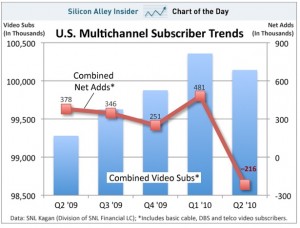On May 30th 2010 we wrote about the alliance of Sony, Google, Intel and Logitec and their effort to control out TV sets by putting at out disposal the wealth of video, both user generated and commercial, floating in the Web. Well, the days when streaming television displace traditional TV viewing may not be far. The inserted graph from business insider shows that for the first time ever there is a drop in Pay TV subscribers. Pay TV has sailed through the economic crisis adding net subscribers every quarter, until Q2’10.
It is still to early to have definite studies to know if the real reason for this decline is that customers are dropping cable and satellite in favor of streamed or downloaded TV programs. The true fact is that in addition to the yet to be deployed Google TV there are a myriad of offerings that bring traditional cable and satellite content to your PC (examples, by no means endorsed here, are “digitaltvonpc” and “digiatlsatelite.tv”.)
If these changes in customer attitudes toward streaming versus cable or satellite materialize, there are two issues that will have to be resolved soon. The first one is emission rights. Currently, Hulu.com and the traditional networks (ABC.com and alike) prevent users with IP addresses from outside the USA from watching their content, as most likely the rights to their programs have been sold to traditional channels for broadcasting outside the US and not blocking them would violate these rights. This does not seem to be the case of the “digital to pc” sites mentioned above, which currently allow thousands of channels to be watched from anywhere in the world. In any case, as it is well known, there are many proxy services that will allow a user anywhere in the world appear to the sender as if he or she were located wherever the proxy service is located, rendering the IP locator service quite ineffective as a territorial rights management system. Content owners will have to start writing distribution contracts without territorial exclusivity and charge these new “channels” either by the number of viewers or be advertising supported in some sort of revenue sharing agreement.
The second big change will have to come from the segregation of content as they transit through the pipes. It seems quite unlikely that in most countries, where many networks, and the local loop in particular, are still copper, the infrastructure will sustain the enormous growth in traffic that will come parallel with the new services. And if this is the case, it seems only logical that both customers and companies will be willing to pay some extra cash to guarantee that some content, in particular live events, will have enough bandwidth for a perfect image by taking preference over less critical traffic like email or P2P downloads, for example, where a hiccup or a few seconds is imperceptible. And this will raise all kinds of irate reactions form the net neutrality advocates, who will see this as an open door for possible discrimination, not only for customers that pay differently for different services, but for content type. The pressure that telecom companies will exert for the enactement this discrimination in quality will be enormous, as they will see in it the possibility of breaking from the terrible commoditizatin cycle with “all you can eat” fixed prices they are inmersed in. Polititians, regulators, customers, and telcos will have to come to an agreement in that issue soon.
In any event, the TV industry is in flux as the music industry was a few years ago, and we have to see whether any lessons regarding pricing, ease of use, and DRM were learnt from it.




Fantastic article.